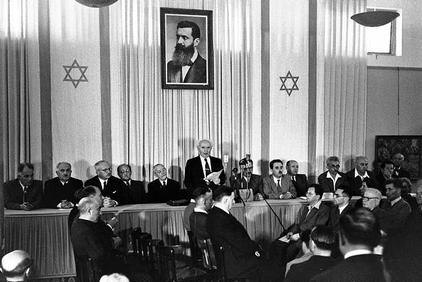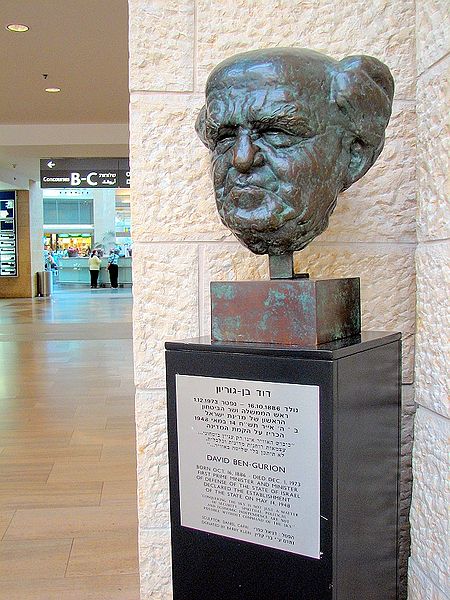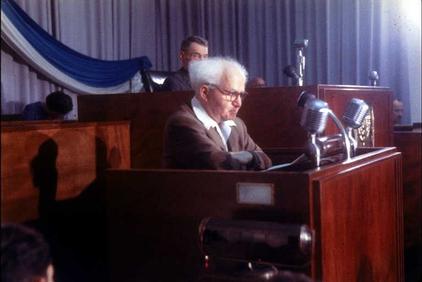<Back to Index>
- Anatomist Albrecht von Haller, 1708
- Writer Oscar Fingal O'Flahertie Wills Wilde, 1854
- 1st Prime Minister of Israel David Ben-Gurion, 1886
PAGE SPONSOR
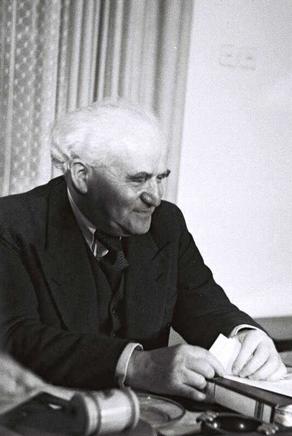
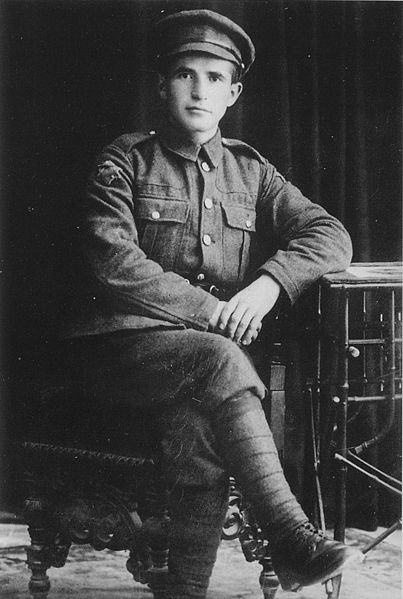
David Ben-Gurion (born David Grün on 16 October 1886, died 1 December 1973) was the first Prime Minister of Israel. Ben-Gurion's passion for Zionism, which began early in life, culminated in his instrumental role in the founding of the state of Israel. After leading Israel to victory in the 1948 Arab-Israeli War, Ben-Gurion helped build the state institutions and oversaw the absorption of vast numbers of Jews from all over the world. Upon retiring from political life in 1970, he moved to Sde Boker, a kibbutz in the Negev desert, where he lived until his death. Posthumously, Ben-Gurion was named one of Time Magazine's 100 Most Important People of the 20th Century.
Ben-Gurion was born in Płońsk, Congress Poland which was then part of the Russian Empire. His father, Avigdor Grün, was a lawyer and a leader in the Hovevei Zion movement. His mother, Scheindel, died when he was 11 years old. Ben-Gurion grew up to be an ardent Zionist. As a student at the University of Warsaw, he joined the Marxist Poale Zion movement in 1904. He was arrested twice during the Russian Revolution of 1905. He immigrated to Ottoman Palestine in 1906, shocked by the pogroms and anti-Semitism of life in Eastern Europe, and became a major leader of Poale Zion with Yitzhak Ben-Zvi.
In Palestine, he first worked in agriculture, picking oranges. In 1909 he volunteered with HaShomer, a force of volunteers who helped guard isolated Jewish agricultural communities. On November 7, 1911, Ben Gurion arrived in Thessaloniki in order to learn Turkish for his law studies. The city, which had a large Jewish community, impressed Ben Gurion who called it "a Jewish city that has no equal in the world." He also realized there that "the Jews were capable of all types of work," from rich businessmen and professors, to merchants, craftsmen and porters. In 1912, he moved to Constantinople (now Istanbul), the then Ottoman capital, to study law at Istanbul University together with Ben-Zvi, and adopted the Hebrew name Ben-Gurion, after the medieval historian Yosef ben Gurion. He also worked as a journalist. In 1915, Ben-Gurion and Ben-Zvi were expelled from Palestine, still under Ottoman rule, for their political activities.
Settling in New York City in 1915, he met Russian-born Paula Munweis. They were married in 1917, and had three children. He joined the British army in 1918 as part of the 38th Battalion of the Jewish Legion (following the Balfour Declaration in November 1917). He and his family returned to Palestine after World War I following its capture by the British from the Ottoman Empire. After the death of theorist Ber Borochov, the left-wing and right-wing of Poale Zion split in 1919 with Ben-Gurion and his friend Berl Katznelson leading the right faction of the Labor Zionist movement. The Right Poale Zion formed Ahdut HaAvoda with Ben-Gurion as leader in 1919. In 1920 he assisted in the formation and subsequently became general secretary of the Histadrut, the Zionist Labor Federation in Palestine. In 1930, Hapoel Hatzair (founded by A.D. Gordon in 1905) and Ahdut HaAvoda joined forces to create Mapai,
the more right-wing Zionist labor party (it was still a left-wing
organization, but not as far left as other factions) under Ben-Gurion's
leadership. The left-wing of Labour Zionism was represented by Mapam. Labor Zionism became the dominant tendency in the World Zionist Organization and in 1935 Ben-Gurion became chairman of the executive committee of the Jewish Agency for Palestine, a role he kept until the creation of the state of Israel in 1948. During the 1936–1939 Arab revolt in Palestine, Ben-Gurion instigated a policy of restraint ("Havlagah") in which the Haganah and
other Jewish groups did not retaliate for Arab attacks against Jewish
civilians, concentrating only on self-defense. In 1937, the Peel Commission recommended partitioning Palestine into Jewish and Arab areas and Ben-Gurion supported this policy. This led to conflict with Ze'ev Jabotinsky who opposed partition and as a result Jabotinsky's supporters split with the Haganah and abandoned Havlagah. The Ben Gurion House, where he lived from 1931 on, and for part of each year after 1953, is now a museum in Tel Aviv. Ben-Gurion recognized the strong attachment of Palestinian Arabs to the land but hoped that this would be overcome in time. Nahum Goldman, president of the World Jewish Congress,
wrote that in a conversation about "the Arab problem" in 1956,
Ben-Gurion stated: "Why should the Arabs make peace? If I was an Arab
leader I would never make terms with Israel. That is natural: we have
taken their country ... There has been anti-Semitism, the Nazis,
Hitler, Auschwitz, but was that their fault? They only see one thing:
we have come here and stolen their country. Why should they accept
that? They may perhaps forget in one or two generations' time, but for
the moment there is no chance. So it is simple: we have to stay strong
and maintain a powerful army." Goldman
criticized Ben-Gurion for what he viewed as Ben-Gurion's
confrontational approach to the Arab world. Goldman wrote that
"Ben-Gurion is the man principally responsible for the anti-Arab
policy, because it was he who moulded the thinking of generations of
Israelis." The
view that Ben-Gurion's assessment of Arab feelings led him to emphasize
the need to build up Jewish military strength is supported by Simha Flapan,
who quoted Ben-Gurion as stating in 1938: "I believe in our power, in
our power which will grow, and if it will grow agreement will come..." The British 1939 White paper stipulated that Jewish immigration to Palestine was
to be limited to 15,000 a year for the first five years, and would
subsequently be contingent on Arab consent. Restrictions were also
placed on the rights of Jews to buy land from Arabs. After this
Ben-Gurion changed his policy towards the British, stating: "Peace in
Palestine is not the best situation for thwarting the policy of the
White Paper". Ben-Gurion believed a peaceful solution with the Arabs had no chance and soon began preparing the Yishuv for
war. According to Teveth 'through his campaign to mobilize the Yishuv
in support of the British war effort, he strove to build the nucleus of
a "Hebrew army", and his success in this endeavor later brought victory
to Zionism in the struggle to establish a Jewish state.' During the Second World War, Ben-Gurion encouraged the Jews of Palestine to volunteer for the British army. He famously told Jews to "support the British as if there is no White Paper and oppose the White Paper as if there is no war". About
10% of the Jewish population of Palestine volunteered for the British
army, including many women. At the same time Ben-Gurion helped the
illegal immigration of thousands of European Jewish refugees to Palestine during a period when the British placed heavy restrictions on Jewish immigration. In 1946 Ben-Gurion agreed that the Haganah could cooperate with Menachem Begin's Irgun in fighting the British. Ben-Gurion initially agreed to Begin's plan to carry out the 1946 King David Hotel bombing,
with the intent of embarrassing (rather than killing) the British
military stationed there. However, when the risks of mass killing
became apparent, Ben-Gurion told Begin to call the operation off; Begin
refused. Illegal Jewish migration led to pressure on the British to either allow Jewish migration (as required by the League of Nations Mandate) or quit - they did the latter in 1948, not changing their restrictions, on the heels of a United Nations resolution partitioning the territory between the Jews and Arabs. In September 1947 Ben-Gurion reached a status quo agreement with the Orthodox Agudat Yisrael party. He sent a letter to Agudat Yisrael stating that while he is committed to establishing a non-theocratic state with freedom of religion he is promising that the Shabbat would be Israel's official day of rest, that in State provided kitchens there will be access to Kosher food, that every effort will be made to provide a single jurisdiction for
Jewish family affairs, and that each sector would be granted autonomy
in the sphere of education, provided minimum standards regarding the
curriculum are observed. To a large extent this letter (or agreement) provided a framework for religious affairs in Israel (e.g. no civil marriages, just as in Mandate times) and is often a benchmark to which the status is compared. During the 1948 Arab-Israeli War Ben-Gurion
oversaw the nascent state's military operations. During the first weeks
of Israel's independence, he ordered all militias to be replaced by one
national army, the Israel Defense Forces (IDF). To that end, Ben-Gurion used a firm hand during the Altalena Affair, a ship carrying arms purchased by the Irgun.
He insisted that all weapons be handed over to the IDF. When fighting
broke out on the Tel Aviv beach he ordered to take it by force and
shell the ship. Sixteen Irgun fighters and three IDF soldiers were
killed in this battle. Following the policy of a unified military
force, he also ordered that the Palmach headquarters be disbanded and its units be integrated with the rest of the IDF, to the chagrin of many of its members. As head of the Jewish Agency,
Ben-Gurion was de-facto leader of Palestine's Jews even before the
state was declared. In this position, Ben-Gurion played a major role in
the 1948 War and the resulting Palestinian exodus.
When the IDF archives and others were opened in the late 1980s,
scholars started to reconsider the events and the role of Ben Gurion.
On 14 May, on the last day the British Mandate, Ben-Gurion declared the independence of the state of Israel.
In the Israeli declaration of independence, he stated that the new
nation would "uphold the full social and political equality of all its
citizens, without distinction of race, creed or sex." After leading Israel during the 1948 Arab-Israeli War, Ben-Gurion was elected Prime Minister of Israel when
his Mapai (Labour) party won the largest number of seats in the first
national election, held on February 14, 1949. He would remain in that
post until 1963, except for a period of nearly two years between 1954
and 1955. As Premier, he oversaw the establishment of the state's
institutions. He presided over various national projects aimed at the
rapid development of the country and its population: Operation Magic Carpet, the airlift of Jews from Arab countries, the construction of the National Water Carrier,
rural development projects and the establishment of new towns and
cities. In particular, he called for pioneering settlement in outlying
areas, especially in the Negev. Ben-Gurion had a major role in the military operations that led to the Qibya massacre in October, 1953. Later in 1953 he announced his intention to withdraw from government and was replaced by Moshe Sharett, who was elected the second Prime Minister of Israel in January, 1954. Ben-Gurion
returned to office in 1955 assuming the post of Defense Minister and
was soon re-elected prime minister. When Ben-Gurion returned to
government, Israeli forces responded more aggressively to Palestinian
guerilla attacks from Gaza — still under Egyptian rule. The growing cycle
of violence led Egypt's President Gamal Abdel Nasser to
build up his arms with the help of the Soviet Union. The Israelis
responded by arming themselves with help from France. Nasser blocked
the passage of Israeli ships through the Red Sea and
Suez Canal. In July 1956, America and Britain withdrew their offer to
fund the Aswan High Dam project on the Nile and a week later Nasser
ordered the nationalization of the French and British controlled Suez
Canal. Ben-Gurion collaborated with the British and French to plan the 1956 Sinai War in which Israel stormed the Sinai Peninsula thus giving British and French forces a pretext to intervene in order to secure the Suez Canal. Intervention by the United States and the United Nations forced
the British and French to back down and Israel to withdraw from Sinai
in return for promises of free navigation through the Red Sea and Suez
Canal. A UN force was stationed between Egypt and Israel. Ben-Gurion stepped down as prime minister for what he described as personal reasons in 1963, and chose Levi Eshkol as his successor. A year later a rivalry developed between the two on the issue of the Lavon Affair. Ben-Gurion broke with the party in June 1965 over Eshkol's handling of the Lavon affair and formed a new party, Rafi which won ten seats in the Knesset. After the Six-Day War, Ben-Gurion was in favour of returning all the occupied territories apart from Jerusalem, the Golan Heights and Mount Hebron. In 1968, when Rafi merged with Mapai to form the Alignment,
Ben-Gurion refused to reconcile with his old party. He favoured
electoral reforms in which a constituency-based system would replace
what he saw as a chaotic proportional representation method. He formed
another new party, the National List, which won four seats in the 1969 election. Ben-Gurion retired from politics in 1970 and spent his last years living in a modest home on the kibbutz. Ben-Gurion believed that the sparsely populated and barren Negev desert
offered a great opportunity for the Jews to settle in Palestine with
minimal obstruction of the Arab population. He set a personal example
by choosing to settle in kibbutz Sde Boker at the centre of the Negev and established the National Water Carrier to
bring water to the area. He saw the struggle to make the desert bloom
as an area where the Jewish people could make a major contribution to
humanity as a whole. Ben-Gurion died on 1 December 1973, and is buried alongside his wife Paula at a site in Midreshet Ben-Gurion in the Negev desert.
